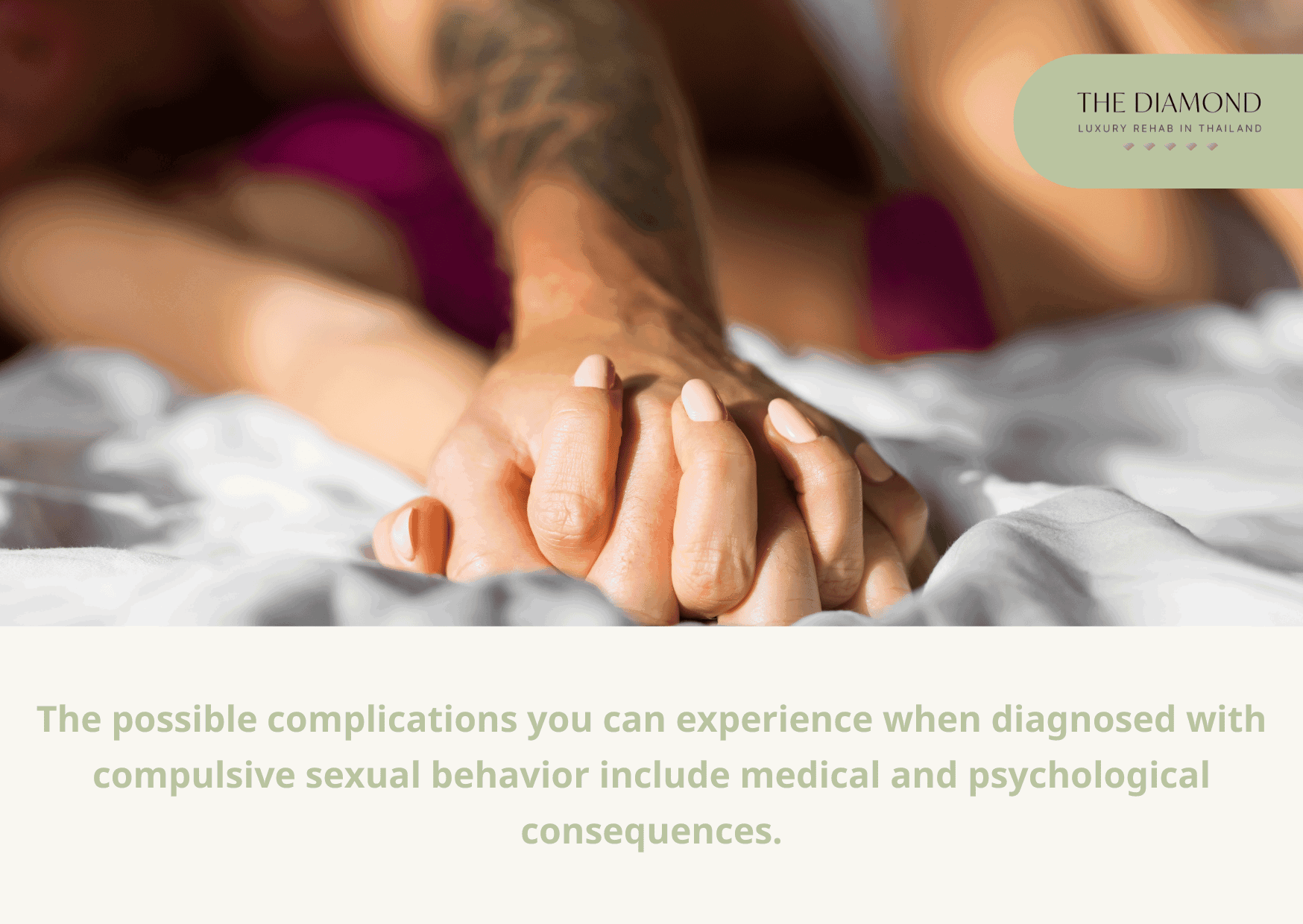Compulsive sexual behavior: an uncontrolled sexual behavior
Table of content
- What is Compulsive sexual behavior?
- When do you need to go to the doctor if you suspect you have Compulsive sexual behavior?
- What are the factors that may increase your chances of developing Compulsive sexual behavior?
- What are the possible complications you can suffer when you have Compulsive sexual behavior?
- What are the preventive measures you should take to avoid developing Compulsive sexual behavior?
- What are the possible treatments after being diagnosed with Compulsive sexual behavior?
- What are some of the different types of psychotherapy to help you deal with Compulsive sexual behavior?
- What medications might you need to help you deal with Compulsive sexual behavior?
- Do people with Compulsive sexual behavior require social coping and emotional support?

Compulsive sexual behavior is defined as repetitive, compulsive sexual behavior, urges, or impulses that cause significant distress in a person’s life.
The symptoms of compulsive sexual behavior include recurrent and intense sexual fantasies, urges, and behaviors, feeling driven to engage in certain behaviors, and feeling guilt or shame afterward. A person with compulsive sexual behavior may attempt to stop and control their sexual behaviors or fantasies, but their efforts are unsuccessful. They tend to continue engaging in certain behaviors and activities despite the harmful effects and damage they cause.
The causes of compulsive sexual behavior may be due to the changes in brain chemicals and the presence of other mental health problems. Easy exposure to sexual content is a common risk factor for this condition.
The effects of this condition may include pronounced feelings of guilt and shame, relationship problems, financial and legal problems, and developing sexually transmitted diseases.
Treatment of compulsive sexual behavior usually includes medications, therapy, and support groups.
What is Compulsive sexual behavior?
Compulsive sexual behavior is the repetitive and excessive preoccupation with sexual urges, fantasies, and behaviors. These behaviors and urges are difficult to control, negatively affect health, relationships, and quality of life, and cause significant distress to an individual.
According to a review published in the Journal of Behavioral Addictions by Professor Jon E. Grant and research assistant Katherine L. Derbyshire of the University of Chicago, compulsive sexual behaviors can be classified into two categories: paraphilic and non-paraphilic behaviors. Paraphilic behaviors are those that deviate from the conventional range of sexual behaviors which include exhibitionism, sexual masochism, voyeurism, pedophilia, sexual sadism, fetishism, frotteurism, and transvestic fetishism.
On the other hand, non-paraphilic behaviors are those that represent engagement in generally available practices. These include excessive exposure to pornography, compulsive masturbation, attending strip clubs, paying for sexual intercourse through prostitution, and extramarital affairs.
In 2019, WHO updated its 11th revision International Classification of Diseases (ICD-11) list and defined compulsive sexual behavior as a persistent pattern of failure to regulate repetitive, intense sexual urges or impulses resulting in repetitive sexual behaviors.
What are other words for Compulsive sexual behavior?
The other terms for compulsive sexual behavior are sexual addiction, hypersexuality, and hypersexuality disorder.
When do you need to go to the doctor if you suspect you have Compulsive sexual behavior?
You need to go to the doctor if you start experiencing trouble with controlling sexual fantasies, difficulty with sexual urges, and uncontrollable engagement in repeated sexual behaviors. Compulsive sexual behavior tends to develop gradually and escalate over time. It is important to seek professional help when signs of the problem become recognizable and start affecting certain aspects of life.
Individuals who suspect they have compulsive sexual behavior may start with assessing and evaluating if they can healthily manage sexual impulses or if their sexual behaviors cause distress in their lives. It also helps to examine whether their sexual behaviors are damaging relationships or whether they’re attempting to hide it.
Seeking help is a personal decision, however, the Mayo Clinic encourages individuals who suspect they have this disorder to remember they’re not alone. Many men and women struggle with compulsive sexual behavior. It’s also helpful to remember that conversations with healthcare professionals are confidential.
In what circumstances do you need to see a doctor right away?
You should see a doctor immediately if you suspect you may cause harm with uncontrolled sexual behavior. Being suicidal and feeling like sexual behavior is getting out of control due to other impulse control problems are also major reasons to see a healthcare professional immediately.
What are the factors that may increase your chances of developing Compulsive sexual behavior?
The factors that may increase the likelihood of developing compulsive sexual behavior include openness to experience, sexual sensation seeking, substance use disorder, and comorbid anxiety and depression. Compulsive sexual disorder has also been linked to negative childhood events such as sexual, physical, and emotional abuse.
A study on a 1-year follow-up of the natural course of compulsive sexual behavior published in the International Journal of Mental Health and Addiction found that sexual sensation seeking, anxiety and depression, openness to experience, and using sex as a means to deal with stress or negative emotions and maladaptive use of online sexual activities are among the factors that persist for over a year. This means that these factors significantly predict the likelihood that an individual may develop compulsive sexual behavior.
Anxiety and substance use disorder increase the risk of developing CSB. According to a study published in Comprehensive Psychiatry on the psychiatric comorbidity and compulsive/impulsive traits in compulsive sexual behavior, 88% of the participants with compulsive sexual behavior suffer from comorbid anxiety and substance use disorders while all of the participants met the diagnostic criteria for an axis I disorder disorder at some point in their lives.
Furthermore, a 2020 systematic review of child sexual abuse and compulsive sexual behavior published in Current Addiction Reports emphasizes that there is a significant relationship between childhood sexual abuse and compulsive sexual behavior. This shows that individuals who experienced childhood sexual abuse are more likely to exhibit CSB and risky sexual behaviors which include unprotected sexual practices with multiple sexual partners.
Do Men have the highest risk of getting Compulsive sexual behavior?
Gender may affect the risk of developing compulsive sexual behavior. Evidence shows men are more likely to develop compulsive sexual behavior than women. A 2021 paper published in the Journal of Clinical Medicine by medical professional Laura I. Kürbitz and Professor Peer Briken from the University Medical Center Hamburg-Eppendorf supports that gender differences play a significant role in developing compulsive sexual behavior and further states that it is more prevalent in men. Men are also reported to exhibit higher rates of sexual behaviors and CSB-related symptoms.
What are the possible complications you can suffer when you have Compulsive sexual behavior?
The possible complications you can experience when diagnosed with compulsive sexual behavior include medical and psychological consequences. A study on understanding and managing compulsive sexual behaviors published in Psychiatry by Timothy W. Fong, MD of the David Geffen School of Medicine expands that individuals with CSB are more vulnerable to contracting sexually transmitted diseases (STDs) and for physical injuries caused by repeated sexual practices. Meanwhile, psychological consequences may include worsening of underlying mental health problems such as depression and anxiety caused by feelings of guilt and shame from engaging in unhealthy sexual activities.
Impaired family and interpersonal relationships may also occur due to neglect and distrust brought about by preoccupation with sexual practices. Compulsive behaviors may also jeopardize healthy realistic satisfying sexual relationships and affect intimacy.

What are the preventive measures you should take to avoid developing Compulsive sexual behavior?
The preventive measures you should practice to lower the chances of developing compulsive sexual behavior include getting immediate help upon the onset of the signs and symptoms of the disorder and learning to recognize signs of the problem in the early stages.
Identifying early symptoms and getting help on time prevents the worsening of compulsive sexual behavior. This also indicates the risk of complications lowers at the same time.
Prevention of compulsive sexual behavior also requires seeking early treatment for mental health problems such as depression and anxiety. Underlying mental health problems can increase the risk of compulsive sexual behavior or can worsen the condition. Getting much-needed help and treatment for underlying mental health problems can reduce the risk of sexual obsession disorder.
Since substance use disorders can induce unhappiness and loss of control or poor judgment, it’s necessary to get help for these conditions. By treating addiction to drugs or alcohol, it becomes easier to improve the sense of control and judgment.
Additionally, reducing exposure to risky behaviors and sexual practices can also aid in the prevention of compulsive sexual behavior. By practicing a healthy approach towards sex, an individual can avoid temptations that lead to risky sexual behaviors and activities.
That way, a person is not tempted to engage in specific sexual behaviors and activities.
What are the possible treatments after being diagnosed with Compulsive sexual behavior?
The possible treatments for compulsive sexual behavior may include psychotherapy like cognitive behavioral therapy and psychodynamic psychotherapy, medications such as antidepressants, and self-help groups.
Self-help groups are helpful for individuals with compulsive sexual behavior and for those who want to deal with issues, this condition can cause. A vast majority of support groups are similar to Alcoholics Anonymous and other 12-step programs.
Individuals with the same problem discuss their lives with compulsive sexual behavior. They also share their experiences and provide support to others. Support groups are intended to enable patients to get support and help while supporting and helping others with sexual addiction diagnoses.
The support groups can help persons with compulsive sexual behavior to learn about their disorder, prevent relapse, find support and understanding, and identify additional hypersexuality treatments.
What are some of the different types of psychotherapy to help you deal with Compulsive sexual behavior?
Psychotherapy is the cornerstone of the treatment of compulsive mental health disorders, substance use disorders, and other mental health problems. The different types of psychotherapy that help with compulsive sexual disorder are cognitive-behavioral therapy (CBT), acceptance and commitment therapy (ACT), and psychodynamic psychotherapy.
Cognitive-behavioral therapy is a form of psychotherapy that helps patients identify unhealthy and negative patterns of thoughts and behaviors to replace them with positive alternatives. The same study by Timothy W. Fong, MD emphasizes that CBT for compulsive sexual behavior focuses on recognizing triggers to sexual behaviors and impulses and modifying cognitive distortions about sexual behaviors.
Evidence confirms that CBT intervention can significantly reduce sexual behaviors and thereby aid the treatment of hypersexual disorder. This type of therapy for sex addiction works by providing additional structure and focus. It emphasizes improving self-management and promotes self-regulation of behavior.
Treatment of compulsive sexual behavior may also include acceptance and commitment therapy (ACT). As a type of CBT, acceptance and commitment therapy is action-oriented and teaches patients to stop denying, avoiding, and struggling with their inner emotions. Instead, ACT enables patients to acknowledge them to commit to making beneficial changes in their behaviors. More precisely, instead of denying the existence of a problem, with ACT patients learn to accept and acknowledge it and then commit to choosing actions that help combat these behaviors.
Meanwhile, psychodynamic psychotherapy is a type of psychoanalysis that focuses on revealing the unconscious content of a patient’s psyche. This type of therapy increases a patient’s awareness of unconscious behaviors and thoughts to provide more insight into their motivations. This helps understand why a patient has compulsive sexual behaviors and contributes to efforts to resolve them.
What medications might you need to help you deal with Compulsive sexual behavior?
The medications that a doctor may prescribe to help deal with compulsive sexual behavior may include antidepressants, naltrexone, anti-androgens, and mood stabilizers.
Pharmacotherapy in compulsive sexual behavior treatment is beneficial because it acts on brain chemicals associated with rewards and obsessive thoughts and behaviors. At this point, there are no medications that are specifically formulated for hypersexual disorder treatment.
A healthcare professional may prescribe medications for underlying conditions associated with CSB. According to a study on the pharmacotherapy of sexual addiction published in Current Psychiatry Reports, selective serotonin reuptake inhibitors, a common antidepressant, may be a pharmacological treatment for sexual addiction. Naltrexone could help patients with behavioral addictions such as compulsive sexual behavior. Naltrexone is typically prescribed for patients with opiate and alcohol dependence. This medication could aid in treating hypersexuality by decreasing compulsive sexual urges and impulses.
It is also important to note that medications and interventions for compulsive sexual behavior should be assessed and administered by registered healthcare professionals after conducting certain tests and diagnoses.
Do people with Compulsive sexual behavior require social coping and emotional support?
Yes, people with compulsive sexual behavior need social coping and emotional support while receiving professional help for the disorder.
An individual with compulsive sexual behavior disorder needs a strong support system and emotional support to recover successfully. People with this disorder experience strong feelings of shame and embarrassment that considerably affect their mental health. A 2022 study on the relation of perceived social support to compulsive sexual behavior published in the Journal of Psychiatric Research highlights the importance of social support for individuals suffering from CSB. Social support may be a protective factor against compulsive sexual behavior by reducing loneliness and improving stable social relationships. It may also lower the risk factors for CSB and help individuals with the disorder manage symptoms and encourage them to seek immediate professional help if needed.
Family and friends have an important role in the treatment of hypersexuality. Family support provides a positive and supportive environment to the patient throughout the treatment process. Support from friends and peers may also positively influence an individual with CSB by showing belongingness and emotional support to the patient.
Overcoming compulsive sexual behavior requires hard work and consistency. Support in general is an essential component of the recovery process and facilitates relapse prevention and successful recovery. Moreover, both the individual and their support system must gain adequate knowledge about the disorder to provide pertinent support to the patient with judgment and stigma.

